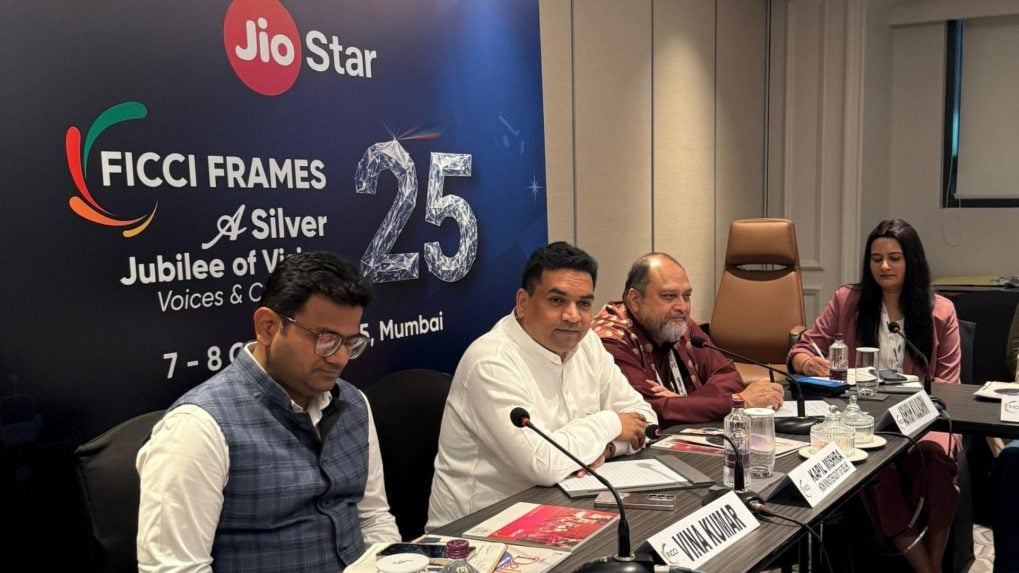Netflix, Prime Video, Zomato call for govt collaboration; Stakeholders raise red flags in M&E policy
Industry leaders back Delhi’s film festival plan but warn that policy reforms, not events alone, will drive creative economy growth.
ADVERTISEMENT
Global streaming platforms Netflix and Amazon Prime Video, along with homegrown tech giant Zomato, have called for greater collaboration with the Delhi government to strengthen the capital’s media, entertainment, and tourism ecosystem. The stakeholders urged the state to address long-standing challenges around red tape, lack of infrastructure, and ease of doing business, while building a sustainable framework that supports content production and creative entrepreneurship.
The calls came during a roundtable meeting held on Wednesday on the sidelines of FICCI Frames 2025, where multiple stakeholders from India’s film, OTT, and digital entertainment sectors engaged with the Delhi government. Participants emphasized that the city’s creative potential remains largely untapped due to cumbersome permission processes, high costs, and limited incentives for production.
Several executives urged the government to introduce a single-window clearance system for film production and events — a mechanism that would streamline approvals across agencies and reduce bureaucratic delays. They also sought improved coordination between departments to ensure accountability and efficiency.
Representing Amazon Prime Video, Shilangi Mukherjee, Director and Head of SVOD Business, revealed that nearly 30% of the platform’s content is currently being shot in the Delhi-NCR region. She said the figure underlined the capital’s growing importance as a creative and production hub.
However, Mukherjee raised red flags over police permissions, calling them a persistent challenge for film and OTT productions. She also highlighted piracy as a critical threat to content creators, noting that Delhi, Maharashtra, and Karnataka remain among the most affected states.
From Netflix, Debra Richards, Director of Production Policy for APAC, emphasized that Delhi can evolve into a major creative hub if the government plays an active role in building a production ecosystem — one that integrates studios, skilled talent, and supportive policy.
Mahima Kaul, Director of Global Affairs, Netflix India, welcomed the Delhi government’s initiative to launch an annual International Film Festival, calling it a step in the right direction. “We appreciate this forward-looking initiative,” Kaul said. “Netflix is keen to work with the Delhi government to nurture the state’s media and entertainment landscape. With collaborative planning, Delhi can become a vibrant node in India’s creative economy.”
Taking the discussion beyond screen-based entertainment, Kunal Khambhati, Founder & COO of District by Eternal pointed out that culture, tourism, and food are intertwined experiences that shape a city’s identity. He proposed partnerships with the government to enhance digital ticketing for heritage sites, enabling seamless access for visitors through integrated platforms.
Khambhati also stressed on building inclusive infrastructure, suggesting that Zomato could work with the government to create accessible venues for people with disabilities.
Prominent industry figures including filmmaker Rakeysh Omprakash Mehra, actor Rajat Kapoor, Divya Dutta, Sabbas Joseph (Wizcraft), Munjal Shroff, Ashish Kulkarni (IICT Board Member), Manvendra Shukul (Lakshya Digital), Uday Singh (MPA), and Prasoon Garg (Applause Entertainment) also participated in the meeting.
Actor Divya Dutta said that the lack of infrastructure remains a major hurdle to the industry’s growth. “Studios and production spaces are scarce and expensive, which drives creators to other states,” she noted.
Arjun Nohwar, Managing Director (India and South Asia) at Warner Bros. Discovery, called for production-linked incentives and the creation of a digital registry of professionals to formalize the sector. He also suggested establishing the Indian Institute of Creative Technologies (IICT) in Delhi to boost skill development and academic collaboration.
Responding to the industry’s feedback, Kapil Mishra, Minister for Languages, Tourism, Art & Culture and Water, Government of Delhi, said the administration intends to make Delhi an entertainment and tourism hub.
“We intend to bring the Delhi International Film Festival every year and build a sustainable ecosystem for the media and entertainment sector,” Mishra told Storyboard18. “Delhi will soon host a majority of film productions. We are addressing industry concerns, establishing single-window clearance, and introducing new policies to spur growth.”
With major players like Netflix, Prime Video, and Zomato pledging collaboration, Delhi’s cultural and digital economy could be on the verge of transformation — from a bureaucratic bottleneck to a creative capital that merges storytelling, technology, and tourism.
Read More: Amazon’s Ad Gamble: Why Prime Video is betting on commercial breaks in India
Read More: GST rate cuts give partial relief to cinemas, OTT gets no concessions
Read More: Vertical OTTs become new Ad frontier as brands seek curated, safe spaces


